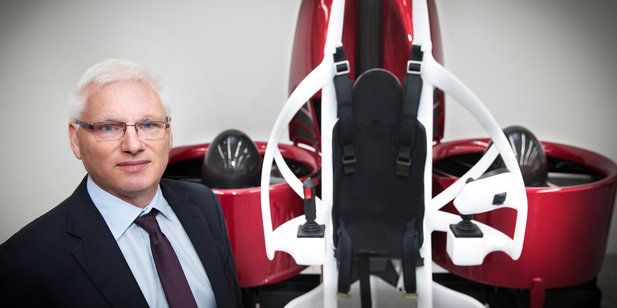
“We like people excelling in sport but we don’t like people excelling in business.”
Martin says to encourage more great innovators, we need to let people fail.
“We know that to create a great athlete, you have to build resilience, people who make mistakes. If they learn from those mistakes, they will get better.”
Martin says that New Zealand has a tall poppy syndrome and rather than condemning failure we need to encourage people to try different things and accept that, sometimes, failure is a crucial element of success.
“If you start a business [which] fails, New Zealanders will go, ‘oh he’s got a failed business; I don’t want to have anything to do with him’.”
Idealog spoke to the Martin Jetpack creator after he gave the keynote speech at the Lightning Lab Manufacturing demo day (a Callaghan Innovation business incubator) held at Sacred Heart College in Lower Hutt on Thursday night.
Sprinkled with some liberal use of a certain four-letter word your grandmother might call colourful, Martin told an enthralled crowd that “vision”, “leverage”, “focus” and “commitment” are important elements to achieving lift-off of an entrepreneurial ambition.
“If you talk to any pilot, it’s fantastic being up in the air,” he says. “I’m sure cavemen had bird envy right from the start.”
However, readers may be surprised to learn that it was a ‘practical’ safety concern which first ignited Martin’s passion for jetpack technology.
“I was five [and] walking to school and I thought it was dangerous walking across this really busy road in Dunedin. Clearly it would be safer to fly across in Jetpacks.”

Entrepreneurs should try to build something new but it was a good idea to stand on the shoulders of those innovators who have gone before, something Martin says has never been easier, thanks to the information superhighway.
“I wrote letters to engineers in the [United] States then had to wait six or eight weeks for a reply. You can leverage worldwide nowadays, thanks to the internet.”
Martin says he was fortunate to have an enthusiastic supporter encouraging him to remain committed and stay the course in pursuit of his dream.
“You have tough times and huge times of self-doubt,” he confesses. “I was very lucky to have a great wife who realised that I would never be happy unless I got a chance to pursue my dream.”
“The emphasis on validating the market and having a great business plan is inappropriate. I don’t think it’s necessary. Nobody knows how many of anything you will sell until somebody fronts up and writes out a cheque.” – Glen Martin
Focus and commitment also means ‘keeping the faith’, in spite of naysayers who doubt the dream can ever become a reality and even question the sanity of the individual pursuing it.
“I used to get various reactions,” he says. “Some people thought I was crazy. I make no apology for that [because] the world is changed by crazy people. Most people who knew me realised I was a bit out there and wacky.”
Martin says he never really worried about turning Martin Jetpacks into a business.
“If I believe Jetpacks are really cool then there’s probably enough people on the planet who think they are really cool to make it a business.”
“The problem with truly innovative products is that you can’t do a marketing plan for truly innovative products.”
He says there is too much of a focus on figuring out how well something will sell and conducting time intensive market research, instead of just single-mindedly pursuing the dream.
“The emphasis on validating the market and having a great business plan is inappropriate. I don’t think it’s necessary. Nobody knows how many of anything you will sell until somebody fronts up and writes out a cheque.”
Nevertheless, Martin bucks the somewhat pessimistic outlook on innovation expressed by some high-profile commentators. Economist Tyler Cowen has written about the Great Stagnation while tech entrepreneur Peter Thiel has lamented the state of large scale game changing innovation today when he said: “We were promised flying cars and we got 140 characters.”
Indeed, 2015 looked so different to the version predicted in Back to the Future that it’s hard to think Doc and Marty McFly wouldn’t be mighty disappointed were they to turn up from 1985.
Martin says the loss of confidence in big projects like the moon landing came about because of a certain ‘insular’ mindset.
“We got distracted by looking inwards rather than looking outwards. We’re all fighting over the same pie.”
While New Zealand can be guilty of this same attitude, Martin says he sees a big advantage in being so far removed from the rest of the world.
“We have this lovely advantage of isolation,” he says. “In New Zealand we can do product development in quiet without anybody knowing what’s going on.”




